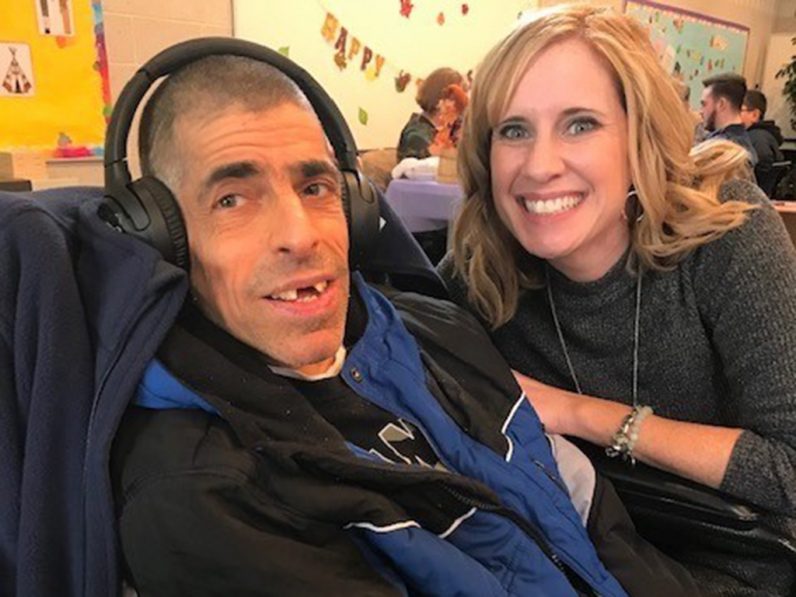
Angela Babcock, director of nursing at Divine Providence Village in Springfield, has been working overtime to protect the facility’s intellectually and developmentally disabled residents from the coronavirus pandemic, inspired by faith, family and the residents themselves. (Photo courtesy of Jean Calvarese-Donovan / Facebook)
As the coronavirus pandemic continues, a Delaware County nurse and her team are working overtime to care for an especially vulnerable population: those with intellectual and developmental disabilities (IDD).
“My husband would tell you I live here,” said Angela Babcock, director of nursing at Divine Providence Village (DPV) in Springfield.
The archdiocesan Catholic Social Services facility (a beneficiary of the Catholic Charities Appeal) provides intermediate care for some 88 adults who live in a number of group residences on its campus.
[hotblock]
For Babcock, a member of St. Francis of Assisi Parish in Springfield, DPV has always been a second home — her uncle was a former resident.
So far, she said, none of DPV’s staff or residents have tested positive for the coronavirus, which has infected more than 575,000 and killed close to 26,500 worldwide. Yet she and her team remain even more vigilant than usual.
“My biggest fear is that my residents will get sick,” said Babcock. “We fight for them so much on a good day. Now, I’m even more fearful of who will get a ventilator if they need it.”
The virus has killed more than 9,000 in Italy, the European epicenter of the pandemic. Faced with a shortage of ventilators, overwhelmed health care systems in that nation have been rationing access to care according to age, disability and underlying medical conditions. With the number of U.S. cases growing, many states are considering similar measures.
Such triage heightens the risk for the IDD population, which has a much higher rate of multiple chronic conditions experienced by an individual at the same time, said Babcock.
In addition, “they respond so differently” even to common sicknesses, she said.
Babcock and her nursing team are following the most updated information available from the Centers for Disease Control (CDC). At present, she said, DPV is “low on protective gear” such as face masks, but is hoping to secure more through a number of outreaches.
To help conserve protective gear, Babcock has suspended her own direct contact with residents, whom she usually visits on a regular basis.
“The biggest challenge is that I have not been able to be with them,” she said. “I normally see them every day, multiple times a day.”
Babcock said her nurses have done “a really good job of explaining” the coronavirus pandemic. While residents “don’t fully understand” the virus’s impact, “they know something’s off,” she said.
“Non-verbal doesn’t mean ‘I don’t communicate,’” said Babcock.
[hotblock2]
To allay the residents’ anxiety, she and her team are “doing as much as possible” to foster a positive mood. One group of DVP residents is planning to relive the Philadelphia Eagles’ 2018 Super Bowl win with a party.
Dancing, games and time spent in the fresh air – with appropriate social distancing – are rounding out the schedule for others.
While Babcock is keeping herself apart from the residents, she sends messages to them through her nurses, whom she described as “amazing.”
“No one is calling out,” she said.
As the virus continues to spread throughout the greater Philadelphia area, Babcock is also monitoring her staff’s well-being closely. She logs close to 75 hours per week at her station to support her nurses, giving them “a place where they know they can let it all out and talk about any anxiety they’re feeling.”
Despite her long shifts, her family has been understanding and supportive, she said. After a long day, she first takes off her shoes before entering the house and then “beelines upstairs” to wash before greeting them.
Her husband, a teacher now working at home, and four children (who attend Cardinal O’Hara High School and St. Francis of Assisi School) have been avoiding unnecessary contact with others to preserve Babcock’s health.
“My husband and my kids have been incredible,” she said. “They believe in the mission of Divine Providence as much as I do.”
Above all, she said, her faith is sustaining her even more deeply at this difficult time.
“It really drives everything I do,” said Babcock. “I wouldn’t be in this position if it weren’t for my faith in God.”
Throughout her day, she turns to prayer for renewed strength.
“I take a moment to pause and center myself in Jesus Christ,” she said.
With the pandemic gaining momentum during Lent, Babcock sees an opportunity to “feel more support in everyone’s prayers,” she said. “We are all a community repenting.”
The DPV residents are an ongoing source of inspiration, she said.
“Our individuals here are the people closest to God, in my opinion,” said Babcock. “They are so pure and so full of grace. They are the most amazing individuals, and it is an honor to serve them.”
PREVIOUS: Daily routines of Catholic education in archdiocese go on despite pandemic
NEXT: As hard times descend, Project HOME still caring ‘for the least of these’



Share this story